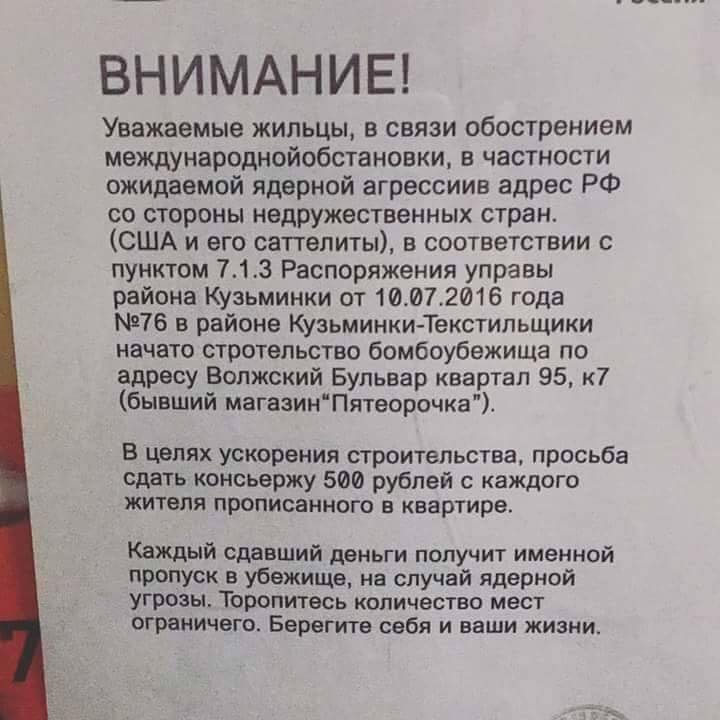Some activities going on in Russia these days might make it seem like the country is genuinely preparing for war. Talk of bunkers and rations; missiles moving around; politicians uttering dire warnings — are these harbingers of a Russian-U.S. conflict?
The Washington Post's Moscow bureau decided to rank the signs to see how likely they suggest that Russia is getting ready to fight.
1. New bomb shelters
A poster appeared in a Moscow neighborhood asking residents to pony up 500 rubles (about $8) for the construction of a new bomb shelter because of "the expected nuclear attack on [Russia] from unfriendly countries (the USA and its satellites.)"
Does this mean war? Most definitely not. It turned out to be a hoax, probably aimed at bilking pensioners.

2. Emergency bread rations
The governor of St. Petersburg, Russia, has approved a plan to ensure emergency rations of 300 grams of bread for 20 days for each of the city's 5 million residents.
Does this mean war? No. It's more of a publicity stunt. Russian commentators quickly seized on the echo from World War II, when a German army held the city — then called Leningrad — in a stranglehold for 900 days. "That is more than twice as much as the ration during the Siege [of Leningrad]," wrote military analyst Alexander Golts in Yezhednevny Zhurnal. "It is also clear why they are reckoning just on 20 days: Given modern weapons, no one will need more."
3. Warmongering politicians
Ultranationalist lawmaker Vladimir Zhirinovsky warned that if America elects Hillary Clinton president, "it's war."
Does this mean war? No. Zhirinovksy, who has vowed to annex Alaska, flatten Poland and the Baltics, and enslave Georgia, made headlines. But his ridiculously misnamed Liberal Democratic Party of Russia controls 39 of the 450 seats in the Russian parliament, and he always votes with the Kremlin. He is a fan of Donald Trump but he's very far from the nuclear button.
4. Hiring a new army
The Russian government approved amendments to a law that allows it to augment its draft army by signing reservists and veterans to six-month paid contracts.
Does this mean war? Most likely not. Golts said that the provision only kicks in "in a period of extraordinary circumstances," such as responding to natural disasters or domestic disturbances. But one circumstance — "to maintain or restore peace and security" — could be interpreted to mean doing it somewhere outside of Russia. "The possibility cannot be ruled out that Moscow is contemplating a major ground operation in Syria," Golts concluded. His logic: The Kremlin has repeatedly promised not to send draftees to fight wars in other countries. That promise wouldn't apply to professional soldiers. For sure, sending troops to Syria, where Russia has already threatened to shoot down U.S. aircraft, could lead to a shooting war. But amending that law is a long way from signing up the soldiers.
5. Missile movements
Russia has moved nuclear-capable missiles to Kaliningrad, a region that borders the Baltic states.
Does this mean war? Not really. The news has stirred fears among some commentators that we are on the brink of nuclear war, and definitely caused concern in the Baltics and Poland, which would be within range of the Iskander missile. Maj. Gen. Igor Konashenkov, a Russian Defense Ministry spokesman, said that one of the missiles was deliberately exposed to a U.S. spy satellite and that the deployment was part of regular training. The foreign minister of Lithuania, which borders Kaliningrad, described the move as a negotiating tactic, albeit an unpleasant one.
https://www.washingtonpost.com/news/worldviews/wp/2016/10/15/are-the-russians-really-preparing-for-war/
Không có nhận xét nào:
Đăng nhận xét